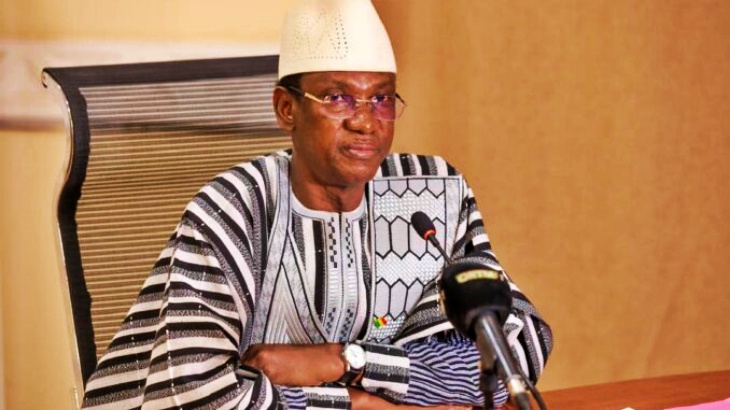Gambiaj.com – (BAMAKO, Mali) – Once hailed as the stalwart defender of Mali’s military junta, Prime Minister Choguel Maïga now finds himself adrift in a political landscape dominated by the very regime he once championed. His staunch loyalty to Colonel Assimi Goïta and the military-led government, marked by fiery anti-Western rhetoric, has failed to shield him from an unraveling relationship with the junta.
Over the years, tensions have simmered, with the Malian press frequently hinting at his growing isolation. Today, Maïga’s public denunciations reveal the depths of his estrangement, exposing fractures within Mali’s fragile transitional government.
Cracks in the Alliance
Maïga’s recent remarks during a gathering of over 1,000 supporters of his M5-RFP movement in Bamako laid bare his grievances. He openly criticized the opacity surrounding key government decisions, particularly regarding the Independent Electoral Management Authority (AIGE).
According to him, AIGE’s establishment bypassed all normative procedures, reflecting a disregard for institutional protocols.
More alarmingly, Maïga accused the junta of unilaterally extending the transitional period, initially set to end in March 2024, without consulting his government.
“The Prime Minister is reduced to relying on press rumors or interpreting the actions of the Minister of Territorial Administration,” he lamented. His call for dialogue with the generals has gone unanswered for over two years, leaving him sidelined in decisions shaping Mali’s political future.
By voicing his frustrations, Maïga has taken a perilous step. Mali’s junta has demonstrated little tolerance for dissent, with political opponents often silenced through imprisonment or intimidation. Maïga’s right-hand man, Boubacar K. Traoré, serves as a cautionary tale.
The interim president of the M5-RFP was arrested in May after releasing a memorandum critical of the junta. Traoré’s charges, including “undermining the credit of the state” and “disturbing public order,” highlight the risks Maïga faces as he dons the mantle of opposition within the government he represents.
Until recently, Maïga appeared to toe the junta’s line, defending controversial decisions such as postponing elections. In April, he rationalized the delays on state television, citing the need for stabilization. However, his current tone marks a stark departure from these earlier defenses, signaling a shift from complicity to confrontation.
A Cautionary Tale of Loyalty and Power
Maïga’s fall from grace underscores the precariousness of alliances within Mali’s military-dominated regime. His isolation raises questions about the junta’s intentions and the viability of the nation’s transition to democracy. Once lauded as a unifying figure for his role in the M5-RFP protests that led to the ousting of former President Ibrahim Boubacar Keïta, Maïga now stands as a cautionary tale of misplaced loyalty.
His plea for transparency and consultation may resonate with Malians disillusioned by the junta’s opaque governance, but it also places him squarely in the crosshairs of a regime notorious for suppressing dissent.
As Maïga walks this precarious path, the broader implications for Mali’s political stability come into focus. The junta’s refusal to engage in dialogue with its own prime minister raises doubts about its commitment to an inclusive transition. The indefinite postponement of elections further compounds these concerns, leaving the nation’s democratic future shrouded in uncertainty.
Maïga’s political isolation, while personal, mirrors a larger struggle within Mali’s transition—a battle between promises of reform and the reality of authoritarian control. Whether his public defiance marks the beginning of a broader reckoning within the regime or a final act of defiance before political irrelevance remains to be seen.
What is certain, however, is that Maïga’s journey from loyal advocate to embattled outcast is emblematic of the fragile nature of power in Mali’s current political landscape.










